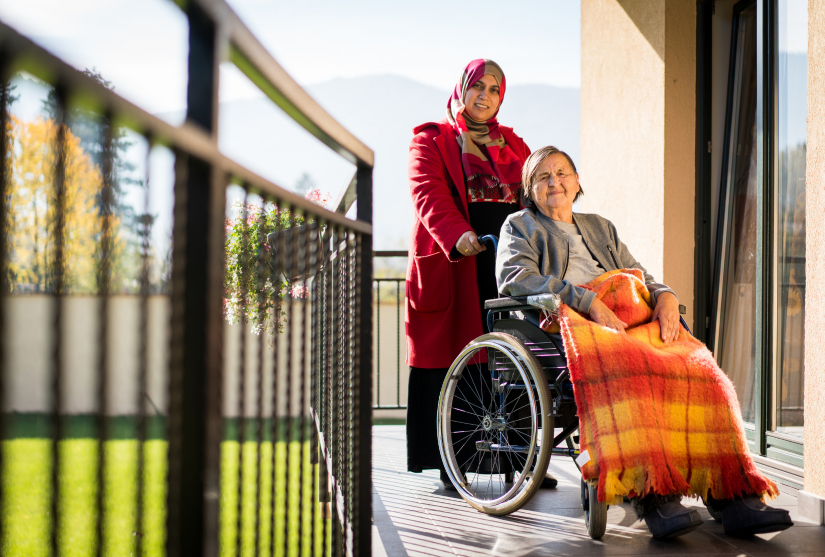UTS IMPACCT researchers are designing studies and trials that are inclusive for people from Culturally and Linguistically Diverse (CALD) backgrounds.

In an article posted to the ABC news site on Wednesday 7 April, Sarah Sedhi reported Lillian Leigh’s clinical trial experience.
Ms Leigh was diagnosed with a rare lung cancer and took part in a clinical trial. She raised issues about diversity in clinical trials, including a lack of inclusion of people from culturally diverse backgrounds and limited understanding of how certain medications may affect people of different ethnicities.
The ABC article raises important issues for clinical trialists. Improving Palliative, Aged and Chronic Care through Clinical Research and Translation (IMPACCT) researchers at UTS are making headway in this space by designing studies and trials that include people from Culturally and Linguistically Diverse (CALD) backgrounds.
Dr Slavica Kochovska, Palliative Care Clinical Studies Collaborative (PaCCSC) Postdoctoral Research Fellow, is leading a study that endeavours to address health inequities. The study Discussing the impact of chronic breathlessness in clinical consultations is open to participants from English-speaking backgrounds and the Arabic-speaking community. This qualitative study aims to investigate patient, caregiver and clinician perspectives of discussing chronic breathlessness in clinical consultations.
Dr Kochovska said, "It is well established that people from CALD communities experience poorer healthcare access and health care outcomes. This is compounded by lack of representation and/or eligibility for potentially life-saving clinical trials. Australia continues to grow in ethnic diversity with almost 30% of the population born overseas. There is a critical need for culturally competent healthcare systems and inclusive healthcare research."
There is a critical need for culturally competent healthcare systems and inclusive healthcare research.
Dr Slavica Kochovska
The methods and enrolment strategies for this PaCCSC study have been designed to facilitate inclusive engagement of participants from CALD backgrounds. Dr Rayan Saleh Moussa, Cancer Symptom Trials (CST) Postdoctoral Research Fellow, is an investigator on the study supporting the participation of people from an Arabic-speaking background.
Dr Saleh Moussa said, "The study is a step towards creating more equitable research and clinical practices to ensure better health outcomes for people living with chronic symptoms in our community."
Dr Jessica Lee is a clinical investigator and UTS PhD candidate, working in the Sydney Local Health District, where she is leading the LiCPain study.
In the Sydney Local Health District, 51% of the population speak a language other than English at home. Other study sites are similar with up to 71% of the population speaking a language other than English at home.
Dr Lee said, "Our community is diverse and people who speak a language other than English are disproportionately disadvantaged in equity of access to both optimal healthcare and research."
It is important that culturally and linguistically diverse people have access to clinical research to ensure that the evidence gathered is applicable to them. We know that there are potential factors such as racial differences in opioid receptors, cultural expression of pain, interaction with healthcare professionals, perception of interventions or hospital admission that may impact this.
To date, it has not been easy to achieve inclusion of CALD communities due to limited funding available for investigator-initiated trials and the logistics of translating study materials. However the LiCPain study has recently implemented a series of measures to increase recruitment and equity for CALD patients including changing the inclusion criteria to remove English requirements, utilising interpreters and accessing translated versions of patient reported outcome tools.
Ms Leigh’s experience has highlighted an important challenge. She told Sarah Sedhi that the clinical trial that she participated in had been vital for her and she hoped they would become more inclusive for people from CALD backgrounds.
The Australian Clinical Trials Alliance (ACTA) (opens external site) agrees and is working on a project to improve diversity in clinical research. They are advocating for action to improve clinical research equity (including clinical trials), for all underrepresented and underserved groups within Australia.
PaCCSC and CST at IMPACCT have an important role to play in this conversation and are pleased to be a part of removing barriers to participation for all members of our community.
Read the ABC news article: A push to make Australia’s clinical trials more diverse is important for people like Lillian Leigh (opens external site)

